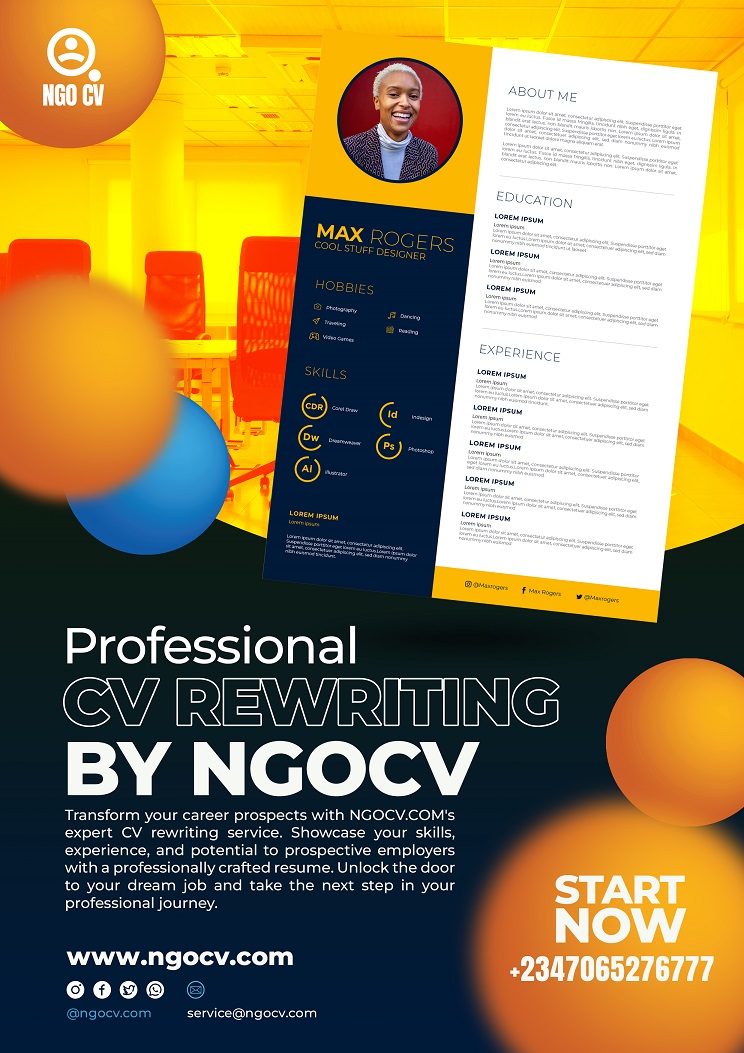
The Norwegian Refugee Council (NRC) is an independent, humanitarian, international Non-Governmental Organization that works to protect the rights of the displaced and vulnerable people during crisis. NRC provides assistance in the areas of Water Sanitation and Hygiene (WASH), Education, Food Security and Livelihoods, Shelter, Information Counseling and Legal Assistance (ICLA) and Camp Management. NRC has been providing humanitarian assistance to the displaced population of North-East Nigeria since 2015.
NRC invites submissions from interested and qualified individuals to participate in the tender for the provision of consultancy service.
TERMS OF REFERENCE
Position: Research Consultant
Duration of the consultancy: 9 weeks
Start date: 1st September 2021
End date: 3rd November 2021
Main locations: Riyom, Bassa, Wase, Mangu, Shandam and Bokkos – Jos, Nigeria**
Programme Area: Research
Reports to: Head of Programmes and Area Manager, Jos
Technical Line: Information, Counselling and Legal Assistance (ICLA) Specialist, and Monitoring and Evaluation Manager
Duty station: Jos, Plateau State
Travel: 70%
1, PURPOSE OF THE CONSULTANCY
The Nigeria Country Office of NRC is seeking an individual Consultant to conduct research and prepare a practice-focused analysis and report on current practices of Community-Based Dispute Resolution (CBDR) structures/mechanisms and their capacity to settle disputes/issues over Housing, Land and Property (HLP) rights in the selected Local Government Areas (LGAs) in Plateau State, Northcentral Nigeria.
Specifically, the study aims to:
a. Map local statutory, traditional and religious CBDR structures and actors, and their organizational capacity and experience, the kind of services they provide, their geographical coverage, and sectoral focus, and whether these mechanisms/structures are seen as legitimate and accessible to target communities, including women and vulnerable individuals and groups;
b. Develop a typology of HLP disputes and resolution mechanisms including case studies to help improve the evidence base to inform future work on CBDR;
c. Present recommendations on strategies to enhance capacities of customary and local government actors in the resolution of HLP disputes, and in peacebuilding; and
d. Develop policy briefs on CBDR. In consultation with NRC, draft at least three policy briefs covering topics such as: CBDR and the peace process; land and the peace process; and CBDR and women’s participation.
2. BACKGROUND AND CONTEXT
Over the past decade, the conflict that is characterised by armed clashes between herdsmen and farmers, and bandits and local communities has taken its toll of Northcentral and Northwest Zones of Nigeria. As a result, lives and property have been lost, people kidnapped, and some others displaced. According to Krause, the conflict in the Plateau State revolves around “the political crisis over ‘indigene’ rights and political representation in Jos, capital of Plateau State.”[1] Moreover, the conflict typically finds expressions through claims over unequal “allocation of resources, electoral competition, fears of religious domination, and contested land rights.”[2] Some analyst have argued that the potential for widespread violence will always exist due to the presence of armed groups and proliferation of weapons into Jos, and unresolved underlying issues to the conflict. The tension continually triggers protracted communal conflicts that affect most parts of the State, including: Riyom, Bassa, Wase, Mangu, Shandam and Bokkos. At the heart of the conflict is history, social identity, economy and politics that have become inseparably intertwined
Conflicts over land has become an important part of the crisis since 2001, with the farmers and herders living in tension that often goes violent. Nomadic Fulani herders are accused of damaging crops, while farmers are accused of taking over grazing reserves and traditional cattle routes. In recent incidents, Fulanis have attacked farmers in their land and forcibly grazed their animals and in return, the local community attack Fulani settlement and rustle cattle. The situation was further made more complex with attacks which were linked to Armed Opposition Group (AOG) Boko Haram which occurred in Jos City.
Meanwhile, religious tension continues to pose perceptions of existential threat to people’s identity and has become entrenched in many people’s daily lives. Accordingly, the general public is generally suspicious of inter-religious dialogue, making it difficult to rebuild trust among communities[3]. Therefore, mid-level religious leaders are perceived to be under pressure to protect their communities and to promote social cohesion in an ethically sensitive environment.
Community structures for dispute resolution exist. These include traditional and religious structures, formal courts of law, and peace committees. While in some of the locations, the established cultural body with the mandate to foster peace among the entire ethnic groups through the instrumentality of amicable dispute resolutions and dialogue faces some resistance as the indigenes do not consider such bodies as legitimate. The various peace committees have been set in time past to address inter-communal disputes especially relating to conflictual relationship between the farmer and herder groups.
The proposed project contributes to efforts to de-escalation the conflict and to promote peacebuilding among communities. Therefore, the study seeks to understand the current practices of CBDR structures/mechanisms and their capacity to settle disputes/issues over HLP rights in the selected LGAs in Plateau State, **
3. SCOPE OF THE CONSULTANCY
The study is expected to enable the NRC Nigeria programme to implement relevant, effective and sustainable programming to address HLP disputes. Recommendations generated by the study will inform how the ICLA programme can advance the HLP rights of conflict-affected population and contribute to peacebuilding and social cohesion in affected communities through its community-based dispute resolution activities.
The scope of the proposed consultancy includes the following tasks:
● Review relevant literature regarding HLP and dispute resolution structures in northcentral Nigeria;
● Administer research tools with displacement-affected and host communities, and other key stakeholders to understand the existing CDR structures and current HLP situation;
● Produce a detailed report on the status of CDR structures and their role in promoting access to HLP rights in Plateau state;
● Present recommendations on strategies to enhance capacities of customary and local government actors in the resolution of HLP disputes, and in peacebuilding;
● Draft policy briefs on CBDR on among others: CBDR and the peace process; land and the peace process; and CBDR and women’s participation; and
● Prepare and deliver a presentation on the study findings.
4. RECOMMENDED METHODOLOGY AND TASKS
● The consultancy will propose an appropriate methodology based on the study deliverables. Ideally, the methodology will include the following core elements:
o A desk review of relevant reports, key project documents;
o Develop and test proposed research tools;
o Field data collection;
o Data analysis and reporting; and
o Workshop with relevant staff in NRC Nigeria to present findings and identify possible programme interventions.
Tasks to be supported by NRC:
● Provision of secondary information/reference documents as well as contacts of partners and resource persons; and
● Data collection in the field.
5. DELIVERABLES, PHASES AND TIMELINE
The deliverables expected in the undertaking of this study include, but are not limited to, the following:
- Inception report detailing objectives and key research questions, methodology, data collection methods, sampling considerations, timeline and logistics, etc.;
- Draft report and cleaned database;
- A detailed final report with key findings, conclusion and recommendations. The final report should be in English and should not exceed 60 pages. It should include an executive summary, description of the methodology, findings and recommendations. Technical details of the main report should be confined to appendices, which should also include a list of key informants and the consultant’s work schedule. Background information should only be included when it is directly relevant to the report’s analysis and conclusions. Recommendations should also include details as to how they might be implemented;
- Policy briefs which includes the following topics: CBDR and the peace process; land and the peace process; and CBDR and women’s participation; and
- Dissemination workshop with NRC staff and other key stakeholders on major findings and recommendations of the study findings.
It is anticipated that the research will be conducted over a total period of 2 months, with the phases specified as follows:
Phase
Duration
Desk review, development and pre-test of research tools and training on data collection. (Submission on inception report at the end of this phase)
3 weeks
Field data collection
2 weeks
Analysis and production of a draft report
2 weeks
Submission of final report
1 week
Dissemination phase
2 days
6. CONSULTANCY TEAM COMPOSITION
The Research Lead should have the following qualifications:
- An advanced degree in Law, Political Science or related social sciences, or a combination of a Bachelor degree in any of the specified fields of study plus extensive professional research experience, with focus on HLP, access to justice and collaborative dispute resolution mechanisms.
- Sound knowledge of CDR and HLP including women’s rights in conflict or post-conflict communities, including forced displacement, humanitarian assistance and development.
- Experience with quantitative and qualitative data collection in field settings.
- Experience carrying out analysis of complex analysis of qualitative and quantitative data.
- Previous experience in north central Nigeria or similar context is preferred.
- Knowledge of participatory survey approaches, gender responsive tools, and CAPI survey tools.
This consultancy is open to both national and international consultants. There is a preference for a combination, where international expertise is combined with national/local knowledge. NRC and local partners on the ground can be engaged for data-collection and logistical support.
7. ASSESSMENT AREA, DUTY STATION SAFETY AND SECURITY
It is understood that a physical presence of the consultancy in the project area will result in the highest quality deliverable. Hence, while recognizing the access limitation and current COVID-19 circumstances, the consultancy is expected to be ready and available to travel (when feasible). The NRC Office in Abuja and Jos will be able to provide logistic support for movement within Nigeria, including the booking of commercial flights, vehicle hire and accommodation, the cost associated within country travel only will be covered by NRC, however the consultancy has to be able to get local access autonomously.
Due to COVID-19 restrictions the most probable scenario will be the consultant working home based with a close coordination with the ICLA team for the data collection phase.
Safety and security: It should be evident that the rapid socio-economic impact assessment should be conflict sensitive. As conducting an assessment during the COVID 19 crisis may put the consultants, NRC-staff, partner organizations and local communities at risk, safety and security concerns need to be included in all stages of the assessment.
8. INSTITUTIONAL AND ORGANIZATIONAL ARRANGEMENTS
Duties of the consultant:
- Reports should be submitted in Microsoft Word format in electronic format, in UK English. All text should be unformatted. Graphs or other graphical devices should be editable (i.e. not pictures). All references must be cited according to convention, and detailed in a bibliography, using the Harvard system as set out in the UNESCO Style Manual. All verbatim quotations must appear in quotation marks, and must not be of excessive length. All data collected under the consultancy must be submitted with the deliverables, in a widely recognised format such as Microsoft Excel in electronic form.
- Everything submitted to NRC must be the original work of the consultants. Any plagiarism in any form, or any other breach of intellectual property rights, will automatically disqualify the consultant from receiving any further payments under the contract by NRC, and NRC will seek to recover any payments already made.
- The consultant will follow Ethical Research Involving Children guidance on the ethical participation of children. In addition, all participants in any study or other interaction will be fully informed about the nature and purpose of the interaction and their requested involvement. Informed consent must be obtained for any photographs, audio or video recordings, etc., in accordance with NRC’s policy on consent.
- NRC retains the right to copyrights with regard to products, processes, and other materials which the Individual Consultant has developed for NRC under this contract and which bears a direct relation to or are produced or prepared or collected in consequence of, or during the course of, the performance of the Contract, and the Individual Consultant acknowledges and agrees that such products, documents and other materials constitute works made for hire for NRC. **
- Equipment to be used: the consultant will use her personal laptop and other equipment;**
- The Consultant is responsible for her own health & accident insurance, except in high risk environments, where insurance will be provided by NRC;
- The Consultant is responsible for her visa/permits for Nigeria with support from NRC.
- International travel and subsistence costs:
- International travels are covered by the specified amount in the budget. The Consultant is responsible for the booking through BCD Travel Operations Oslo. There is no travel allocation or per diem for international or national travels. This is an all-in-fee consultancy
- Local travel and transport
- Transport between the NRC offices within Nigeria is provided by NRC
- Accommodation within Nigeria will be covered by NRC. Where possible, NRC will host the consultant in existing guesthouses. If no room is available, the consultant will be booked into NRC security cleared hotels.
- NRC will provide invitation letter if required by authorities for travels discussed and agreed with the head of Programmes
- The Consultant must observe all NRC security policies and regulations while working with NRC and while in NRC premises or vehicles. The consultant agrees to observe NRC’s Code of Conduct while working with NRC.
How to apply
1. TENDER PROCESS: All interested candidates are requested to submit their bid along with other required documents listed below to the following email: [email protected]
2. The application should be titled “41/NRC-NOT/NG/2021- Study of Existing CBDR Structures in Plateau State- NIGERIA” in the e-mail subject line. Only shortlisted candidate that meet the specified criteria will be contacted.
3. Closing Date**
The deadline for submission of bids is 20th August 2021. All tenders submitted after that date will be rejected.
4. Any request for clarification/ technical questions can be addressed to [email protected], [email protected] and copy [email protected].
5. Please use the link below to download the Tender Document
https://docs.google.com/document/d/1Fm6TR7gIaPdON_v7xFYyTd5xqHfcPed6qOP9Ase0IoM/edit?usp=sharing




